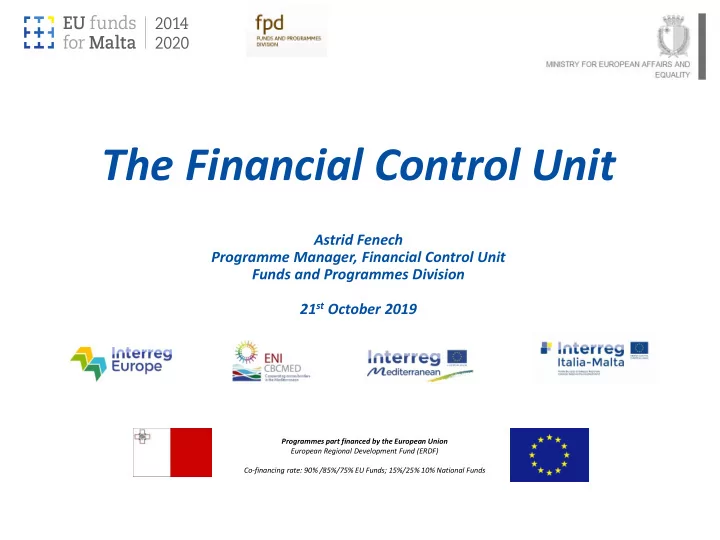

The Financial Control Unit Astrid Fenech Programme Manager, Financial Control Unit Funds and Programmes Division 21 st October 2019 Programmes part financed by the European Union European Regional Development Fund (ERDF) Co-financing rate: 90% /85%/75% EU Funds; 15%/25% 10% National Funds
Presentation Outline ❑ The role of the Financial Control Unit ❑ The Sampling Methodology ❑ Recommendations
Role of the Financial Control Unit The FCU within the Funds & Programmes Division was set up to provide an added level of assurance to the Head of the National Authority; The National Authority is represented by the European Territorial Cooperation Unit within the Funds & Programmes Division. Through its direct reporting to the Head, and also given that the Unit is independent of the first level control checks undertaken, the nature of its function and its governance structure make it a very important aspect of the management and control structures of the National Authority (NA).
Role of FLC What will the FCU do? The Financial Control Unit (FCU) will carry out FLCs verify and confirm eligible checks on the first level the expenditure through: control performance and Desk-based checks - Checks the quality of the control of the relevant documentation: system. compulsory for each progress Checks by FCU shall be report done on a sample basis On-the-spot checks - using a risk assessment Existence and delivery of goods analysis system that and services: at least once determines which projects during the project lifetime should be evaluated. 100% check
The Sampling Methodology Every six months, the FCU will take stock of all claims submitted by the four programmes, and will identify and determine the number of First Level Controllers involved; A maximum of 2% of the FLC’s will be selected for checking, on the basis of risk analysis. Priority is given to FLCs entailing the most risk; The other FLCs will be selected through a random sample (generated by Microsoft Excel or ACL Acerno). This will amount to 20% of the remaining FLCs; Every six months a minimum of 6 FLCs and a maximum of 12 FLCs will be checked;
The Sampling Methodology To note that the 2% and the 20% are applicable on all four programmes together; A minimum of 1 FLC per period has to derive from each of the four programmes, subject to whether the programmes had a verified claim; FLCs who were subject to a quality control check in the 1 st six months, will be excluded from the sample of the next six months; A maximum of 2% of the FLC’s will be selected for checking, on the basis of risk analysis. Priority is given to FLCs entailing the most risk; The sampling methodology is thought to be a strong defence against potential errors as it provides the FCU with sufficient coverage and over a span of time, all the FLCs would be subject to quality control checks.
Other Checks Additionally, the TCU staff may accompany FCU staff in the carrying out of on-the-spot-checks, at least once during the lifetime of a project with the aim of providing for physical verifications and checks whilst also focusing on the achievement of outputs; Monitoring of the project is also maintained through a number of bilateral meetings by the TCU; Additionally, durability checks may be undertaken after programme closure too .
Recommendations to FLCs General Documentation • Ensure that you have the final/revised versions of the programme manuals, National Guidelines and the related Circulars; • The project’s approved Application Form should be cross checked with the expenditures being incurred in the claims and the deliverables of the project. Partners should also provide details/description of the progress being made in the project; • Claim documents should include the project stamp; • FLCs need to ensure that the correct templates are being used; • The necessary signatures should always be in place; • Online systems need to adjusted to reflect any deductions/comments made in the FLC Certificates;
Recommendations to FLCs Staff Costs • The project-related working time performed by a staff member must be recorded daily in a timely manner. For each day, timesheets must incorporate the 100% of the actual working time dedicated to the specific project at hand, together with other projects and other duties (if any) during that same day. (See Memo re Recording of working hours); • The description of the tasks performed, should make sense (eg. Filing); • Since SSC is an eligible cost, we recommend that FLCs check that NI Contributions being paid by employee, are according to National Legislations; • Only fixed allowances are eligible. During Quality checks, proof of such fixed allowances is required;
Recommendations to FLCs Travel and Subsistence Costs • The whole procurement exercise, for the purchasing of travel tickets should be presented; • To follow FCU Circular 04/2018 re the Procurement of Travel tickets; • All meals offered during meetings, (as per meetings agendas) should always be deducted from the subsistence allowance.
Recommendations to FLCs Other types of expenditures • Ensure that all documentation pertaining to the procurement exercise carried out, is available in the file; • Invoices, receipts and proof of payment are available, and payment date falls within the claim reporting period; • When a local meeting/conference is organised, attendance sheets with participants signatures, is required; • Publicity Regulations should be adhered to when issuing meeting/conference agendas, publishing of brochures, etc;
Conclusions FLCs should be comfortable signing the Claim Certificates. With their signature, they are confirming that expenditures and documentation are in accordance with Programme and National Rules; During our Quality Check visits, we would need to see all documentation pertaining to the claim being checked, together with General Documentation; Do not hesitate to contact the FCU or the TCU for any assistance that may be required.
Thank you for your attention Financial Control Unit Funds & Programmes Division Tel.: 2200 1196 Email: astrid.fenech@gov.mt Programmes part financed by the European Union European Regional Development Fund (ERDF) Co-financing rate: 90% /85%/75% EU Funds; 15%/25% 10% National Funds
Recommend
More recommend